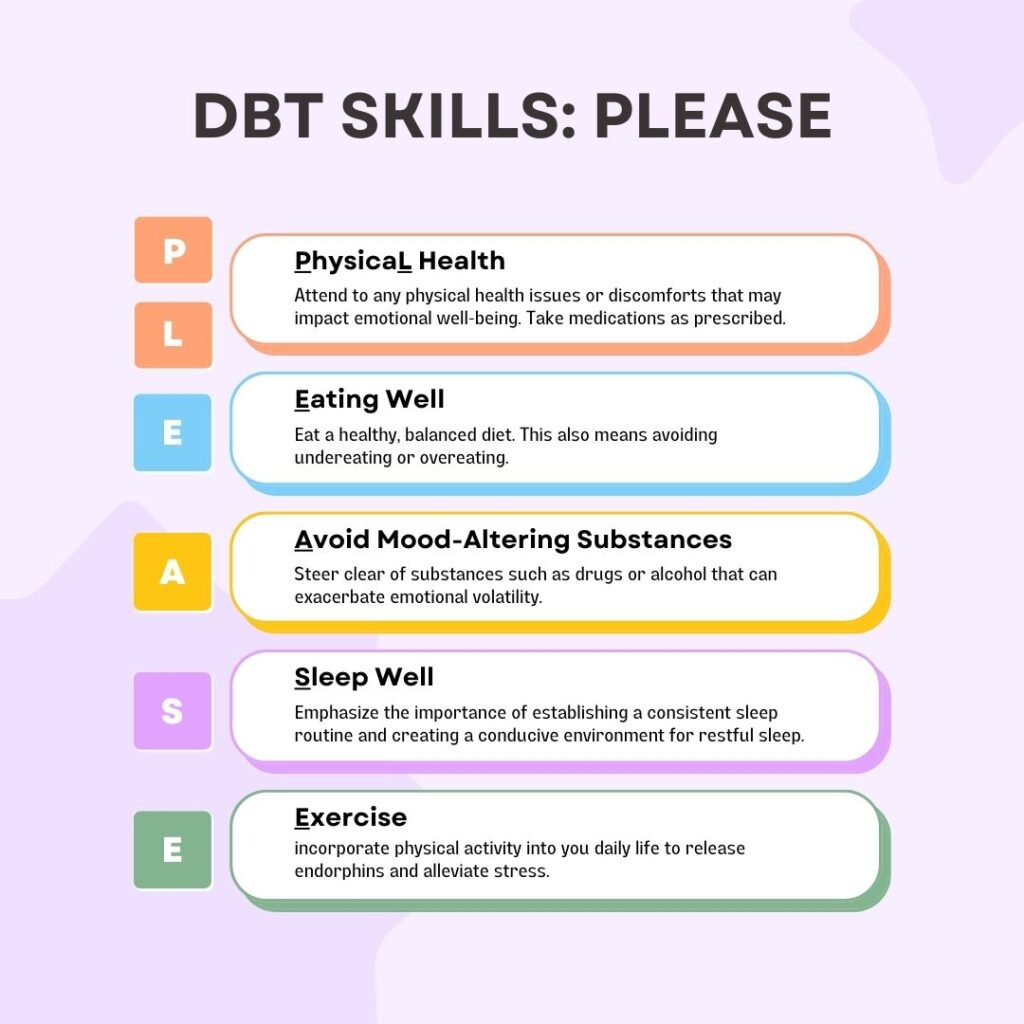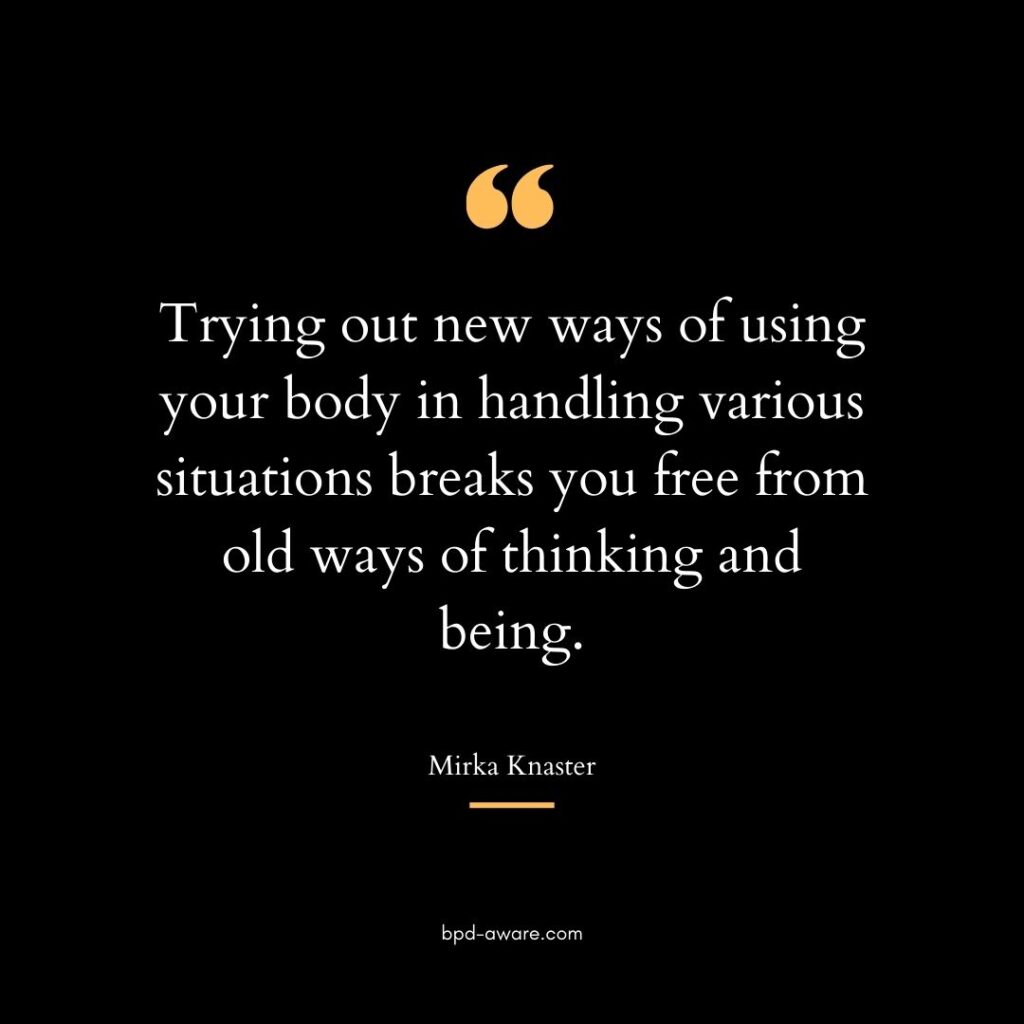Dialectical Behavior Therapy (DBT) is a type of psychotherapy developed by Dr. Marsha Linehan. It’s for people who have a hard time managing their emotions, especially those with Borderline Personality Disorder (BPD). DBT mixes ways of changing behavior and thinking with mindfulness and working through dialectics to help people know themselves better, control their emotions, improve interpersonal relationships, and handle stress.
One key skill in DBT is called “PLEASE,” which helps people to feel more emotionally stable. It’s perhaps the skill within DBT that I have found the most useful in my own life.
“PLEASE” stands for five key things to look after:
- PhysicaL Health: Take care of any health issues or pain that may affect how you feel. This means being proactive about your health and taking any medication prescribed to you as instructed.
- Eating: Eat healthy, balanced meals to keep your blood sugar steady and avoid mood changes. It’s also important to avoid overeating or undereating.
- Avoid Mood-Altering Substances: Avoid drugs or alcohol as they can make mood swings worse.
- Sleep: Make sure to follow a healthy sleep routine, going to bed at the same time and rising at the same each each morning. Your sleeping area should be comfortable and without distractions such as TVs or phones.
- Exercise: Exercise daily to help release endorphins and lower stress.
“PLEASE” helps you to control emotions and handle stress by focusing on physiological and behavioral factors that affect mood balance. Looking after basic needs like sleeping well and eating healthily reduces emotional volatility and improves day-to-day life. Exercising regularly can reduce stress and make you feel better. Avoiding illicit substances will prevent mood swings and reduce the risk of impulsive behavior.

How To Follow The PLEASE Skill
PhysicaL Health
Listen to your body’s signals and cues, such as signs of fatigue, pain, or discomfort, and regularly check in with yourself to identify any emerging physical health issues or symptoms.
Take proactive steps to address physical ailments, whether it’s scheduling a doctor’s appointment, seeking medical advice, or practicing self-care techniques like resting when you need to and drinking plenty of water.
Eating
Prepare healthy and nutritious meals ahead of time to ensure regularity and balance in your diet. Pick a window of time such as a Monday evening to plan and prepare some of your meals in advance.
Eat a combination of carbohydrates, proteins, healthy fats, fruits, and vegetables in each meal to stabilize blood sugar levels and support overall well-being.
Practice mindful eating by listening to your body. Pay attention to hunger and fullness cues, and savoring each bite without distractions.
Avoid skipping meals or engaging in restrictive eating patterns, as this can disrupt mood stability and energy levels. Also, be careful not to overeat as this can leave you feeling sluggish.
Avoid Mood-Altering Substances
Take inventory of any substances you consume, including alcohol, drugs, nicotine, and caffeine.
Educate yourself on the potential effects of these substances on mood regulation and mental health. Read our articles about the dangers of caffeine and sugar for people with BPD at the links below:
- How Caffeine Affects Borderline Personality Disorder
- How Sugar Affects Mood Swings in Borderline Personality Disorder
Recognize potential triggers or situations that may lead to substance use and create effective strategies to manage and overcome cravings or urges.
Seek support from trusted individuals or professional resources if you’re struggling to abstain from mood-altering substances.
Sleep
Work on establishing a consistent sleep schedule. Go to bed and wake up at the same time each day, even on weekends.
Learn how to relax in the evening and create a routine that signals to your body that it’s time to wind down. Experiment with things like taking a warm bath, reading, or practicing relaxation techniques.
Make sure your sleep environment is conducive to quality sleep by minimizing noise, light, and distractions.
Limit screen time before bedtime and avoid stimulating activities that can interfere with sleep quality.
Exercise
Find several types of exercise that you enjoy and work them into your daily routine, whether it’s walking, jogging, yoga, dancing, weight lifting, or swimming.
Start with manageable goals and slowly build on your workouts to achieve these goals.
Schedule regular exercise sessions throughout the week to promote consistency and accountability.
Take care to listen to your body and what it’s telling you. If you have aches and pains then you may need to take a few days off from your workouts to prevent injury.
Tips For Incorporating “PLEASE” Into Daily Life
Set reminders or alarms on your phone to prompt you to attend to each component of “PLEASE” throughout the day. For example, set an alarm just before lunchtime to remind you to eat a healthy, balanced meal.
Keep a journal or checklist so you can follow your progress and celebrate the little victories along the way.
Prioritize self-care by scheduling pleasant activities that relieve stress and bring joy into your life.
Seek support from friends, family, or a therapist to help hold you accountable and encourage you on your journey. Don’t be ashamed to ask for help if you struggle along the way.
Recognize that change takes time and be patient with yourself as you work to incorporate “PLEASE” into your life.
Identify potential obstacles or triggers that may hinder your ability to practice self-care and develop strategies to overcome them.
Always remember that self-care isn’t selfish. Self-care is essential for maintaining your overall well-being and resilience in the face of BPD symptoms.

Final Thoughts
Among the skills taught in DBT, the “PLEASE” skill stands out as a practical and effective tool for promoting emotional stability and well-being. By addressing basic physical and behavioral needs like sleep, nutrition, and self-care, “PLEASE” empowers people to proactively manage emotional dysregulation and reduce impulsive behaviors. For those with BPD embarking on their healing journey, incorporating “PLEASE” into a self-care routine can enhance resilience and stability.
By prioritizing physical and emotional wellness, people with BPD can gain greater control over their lives. This increased control allows for long-term growth and fulfillment. I encourage anyone struggling with BPD to explore DBT and the “PLEASE” skill, remembering that healing is possible with dedication, support, and self-compassion.
Sources, Resources, and Further Reading
- What is the PLEASE Skill and How Can It Help?: https://www.charliehealth.com/post/what-is-the-please-dbt-skill-how-can-it-help
- Using the DBT ABC PLEASE Skills to Regulate Emotions: https://sunrisertc.com/abc-please-skills/
















